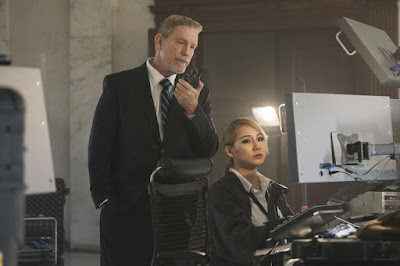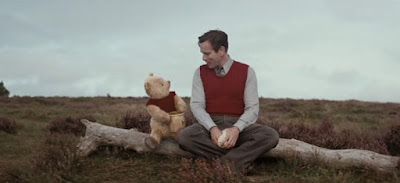Final Verdict: For Mark Wahlberg fans as well as those looking for a good Spy amd espionage thriller, Mile 22 should be skipped as the end result will confuse and frustrate them rather than satisfy.
Monday, June 8, 2020
Mile 22 Dazzles In Action But Largely Disappoints As A Spy/Espionage Thriller
Final Verdict: For Mark Wahlberg fans as well as those looking for a good Spy amd espionage thriller, Mile 22 should be skipped as the end result will confuse and frustrate them rather than satisfy.
White Boy Rick Is A Grim, Thought-provoking, and Entertaining Crime Story That's Solidly Told And Brilliantly Acted
When it comes to Hollywood bringing real life stories to the big screen, one of the most appealing kind that they greenlight outside of biographical dramas or inspirational sports stories, are those that deal with crime. The crime drama is one that has a built in audience, which essentially makes it a safe bet for Hollywood to continue producing true to life stories revolving around that genre. In the case of White Boy Rick, the film meets both the crime and biographical genres halfway with a story, that both holds as well as maintain the audiences interest. Powered by strong performances from its main cast as well as being a compelling enough crime story, White Boy Rick delivers a solid punch in regards to providing audiences with a true story that's powerful, hard-hitting, and carries with it important themes and lessons regarding growing up.
Final Verdict: For Matthew McConaughey fans as well as fans of both biographical and crime dramas, White Boy Rick will entertain, surprise, and suffice their cravings despite having some glaring flaws.
Sunday, June 7, 2020
Sorry To Bother You Is Fierce, Provocative, And Bold With It's Statement Regarding Race And Capitalism
Final Verdict: For those looking for a fun yet thought-provoking satire, Sorry To Bother You is not only entertaining to watch but engaging and thoughtful with its timely themes and messages.
Christopher Robin Is A Charming And Heartfelt Story About Friendship, Family, And Remembering What Matters Most In Life
Making a film based off a popular source material can be both a daunting and risky task in itself. Not only does the film have to live up to the legacy and standard that fans of the source material its adapting have placed upon it, it also has to take the characters and plot and move it forward in a different direction while introducing both to a new generation of audiences. For the filmmakers behind Christopher Robin, their task is to bring the classic story of Winnie The Pooh to life while creating a live-action experience that can be lively, nostalgic, and charming for audiences. For the most part they succeed as Christopher Robin manages to be a faithful, heartwarming, and magical experience for audiences with both it's sweet storytelling and visual appeal of its main characters brought to life on the big screen. While it's not all the way perfect, it works most effectively at rejuvinating the childhood memories of its desired target audience.
In terms of the films directing, Marc Forster does a solid job of creating an atmosphere for the main characters as well as his iconic friends, that feels both enchanting and real. Forster directs the film in a way which the audience feels as if they're actually in the moment with McGregor's character as he slowly relives his childhood. He gives the film the appropriate level of maturity while honing in on the audiences nostalgia of the main characters. The directing he brings to the story gives it both a warm and welcomed feel, that makes the world of Winnie-the-Pooh an inviting one. Outside of the films impressive visual effects, the cinematography stands out as being breathtaking as well as adding to the visual style of the film, which can best be summed up as stunning. The films visual work is both sensational and goes hand-in-hand with the brilliant camera work with the characters of Winnie, Tigger, and Piglet all looking realistic despite the audience realizing the obvious that its McGregor acting by himseif in reality during the scenes where he interacts with the live stuffed animals. The films editing keeps the story moving at a relatively slow pace despite its 103 minute running time with Forster properly utilizing the films first half to set up the character of Christopher Robin, along with showing the distance he has between himself and his family due to his work. When his character reconnects with Pooh and the others, the film doesn't rush it but allows enough time for the audience to witness the re-establishing of that relationship, as well as seeing Robin's transformation back into childhood despite being an adult. Other notable aspects of the films production are the art-set decoration and costume design both being top notch along with adding to the visual flare of the story. The success of Christopher Robin was always going to hinge on the passionate storytelling that its filmmaker would bring to the table. With Marc Forster, he brings passion, dedication, and love to the story as well as an understanding that this is an iconic childrens piece that needs to be cherished, preserved, well-told, and updated to not only appeal to the older fans of the classic stories of Winnie-the-Pooh, but also introduce it to a whole new audience with themes that are essential and poignant.
As for the films writing, the screenplay by Alex Ross Perry, Tom McCarthy, and Allison Schroeder with a story by Greg Brooker, and Mark Steven Johnson is well-written and thoughtful with the film tackling themes pertaining to growing up, childhood, the importance of play, relationships, love, adventure, family, fun, and overworking. Much like Steven Spielberg's Hook, Christopher Robin explores the concept of one growing up and forgetting their magical childhood roots while finding themselves on a bizarre path to remembering their roots. Like the character of Peter Pan in Spielberg's film, Robin starts the story off as being a workaholic along with being distant from his family emotionally due to being overworked by his boss with his wife becoming more frustrated with his lack of attention directed towards his family, and his daughter being constantly disappointed by the lack of her fathers presence in her life much like Pan's family dynamic in Hook. Both films mirror each other in certain aspects while carrying well-meaning messages, which say that family and friends are more important than work. As an adventure story, Hook wins in that regard as Christopher Robin is more laid back and character-driven with the relationship between Robin and Pooh being both the heart and soul of the film. Christopher Robin is written in a way that makes it function as being a strong and appealing family film, that knows first and foremost what it wants to be while never losing sight of its ambition to be a charming and heartfelt experience. The writers make a strong effort to prioritize character development with the arc of Robin and his childhood stuffed animal friends with the core of the story being about a man trying to find his way back to his family. Despite the writing doing such a solid job of rounding out the story of Christopher Robin regaining both his childhood as well as his family, the story has moments where it often feels like it falls into the generic trap of classic Disney film cliches such as the subplot involving Robin's boss overworking him to the point where he forgets what matters most in his life. Other examples of the story being a tad familiar to audiences include the father of Robin's boss rightfully putting his son in his place after his mistreatment of Robin and Robin's daughter having a cliched yet effective moment with her mom in which she asks why her father doesn't spend more time with them with the mothers reassurance that her father loves her and will find his way home. Although these are faults that mainly are a result of the films writing, they're minor ones that don't ruin the movies well-structured plot nor the heavy amounts of emotion and heart that the script possesses.
Final Verdict: For fans of Ewan McGregor and classic Winnie-the-Pooh books, Christopher Robin is the fun, light-hearted, and faithful live action adaptation they've been waiting for.
Subscribe to:
Posts (Atom)
























































